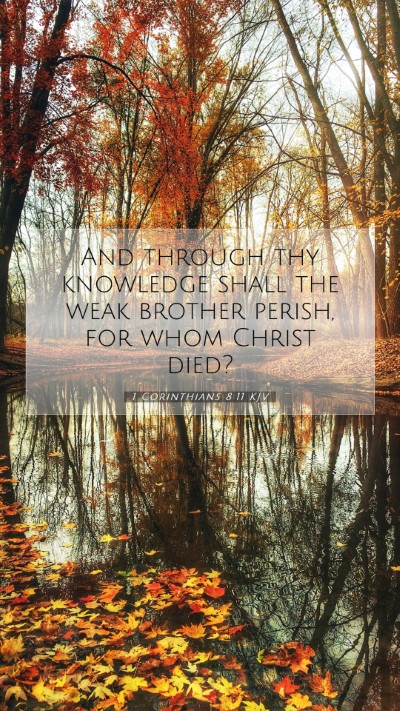Old Testament
Genesis Exodus Leviticus Numbers Deuteronomy Joshua Judges Ruth 1 Samuel 2 Samuel 1 Kings 2 Kings 1 Chronicles 2 Chronicles Ezra Nehemiah Esther Job Psalms Proverbs Ecclesiastes Song of Solomon Isaiah Jeremiah Lamentations Ezekiel Daniel Hosea Joel Amos Obadiah Jonah Micah Nahum Habakkuk Zephaniah Haggai Zechariah Malachi1 Corinthians 8:11 Meaning
What is the meaning of 1 Corinthians 8:11?
And through thy knowledge shall the weak brother perish, for whom Christ died?
1 Corinthians 8:11 Bible Verse Meaning
1 Corinthians 8:11: "And through thy knowledge shall the weak brother perish, for whom Christ died."
Bible Verse Meaning and Interpretations
This verse from 1 Corinthians 8:11 addresses the profound implications of knowledge and its impact on others, especially those who are spiritually weak. Here we present a synthesis of insights from notable public domain commentaries including Matthew Henry, Albert Barnes, and Adam Clarke to unfold the deeper meanings and teachings contained within this passage.
Understanding the Context
The Corinthian church was faced with issues regarding food offered to idols, which sparked debates about the nature of spiritual freedom and responsibility. Paul emphasizes that while a mature believer may understand that an idol is nothing, thereby feeling free to eat such food, this knowledge can lead to the downfall of weaker believers who do not share this understanding.
Key Themes of the Verse
- Responsibility to Others: Believers are called to consider how their actions affect those who are weaker in faith.
- Knowledge vs. Love: This scripture highlights the importance of pairing knowledge with love, as love seeks the good of others.
- Christ's Sacrifice: The sacrificial death of Christ for the weak underscores the gravity of leading others into sin.
Commentary Insights
Matthew Henry's Commentary
Henry explains that even knowledge that may be right can become detrimental if it leads to the spiritual destruction of a weak brother. It emphasizes that one's freedom should never become a stumbling block to others’ faith.
Albert Barnes' Notes
Barnes speaks to the potential consequence of a believer's actions, noting that the strong should abstain from causing the weak to stumble. He asserts that the "perishing" signifies spiritual harm, indicating that the weak may be led away from faith in Christ if they observe the unguarded practices of others.
Adam Clarke's Commentary
Clarke draws attention to the idea that the actions of believers should be measured by love and compassion rather than mere liberty. He emphasizes that Christ’s death symbolizes the extent of God’s care for the weak, urging believers to act in ways that reflect that care.
Application in Daily Life
In essence, this passage teaches that understanding Scripture is not merely an academic exercise but one that requires practical application through love and consideration for others. When engaging in discussions or decisions about morally ambiguous issues, believers should prioritize the well-being of others over their freedoms.
Relevant Cross References
- Romans 14:15: Highlights the importance of not letting our freedom harm another's conscience.
- 1 Corinthians 10:24: Encourages believers to seek the good of others rather than merely their own benefit.
- Galatians 5:13: Reminds followers of Christ to use their freedom to serve one another in love.
Conclusion
Overall, 1 Corinthians 8:11 serves as a powerful reminder of the responsibilities that come with knowledge in our Christian walk. It invites believers to reflect on their decisions and practices that affect others, encouraging a mindset of love and selflessness.


